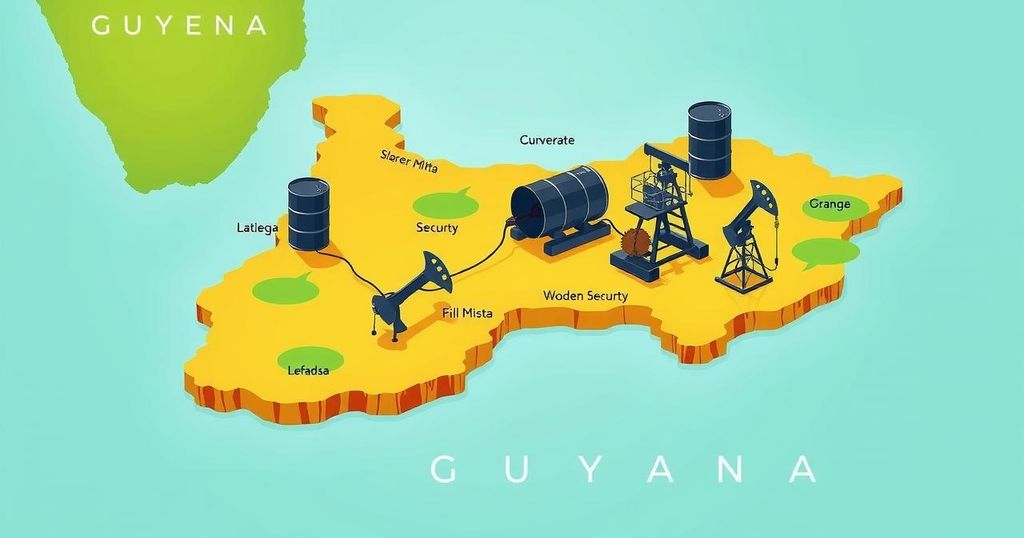Politics
ASIA, CUBA, DENMARK, DIPLOMACY, ESSEQUIBO, EUROPE, FOREIGN POLICY, GREENLAND, GULF, GULF ARAB NATIONS, GULF STATES, GUYANA, GUYANE, INTERNATIONAL RELATIONS, IRAN, JAMAICA, JD VANCE, KUWAIT, LATIN AMERICA, MARCO RUBIO, NATO, NORTH AMERICA, PANAMA CANAL, QATAR, REGIONAL SECURITY, RUBIO, SOUTH AMERICA, STATE DEPARTMENT, SURINAME, TRUMP, UNITED STATES, US, VENEZUELA
Sophia Klein
U.S. Security Cooperation with Guyana Amid Venezuelan Tensions
Senator Marco Rubio will visit Guyana to offer U.S. security support against Venezuelan claims over oil-rich territories. The memorandum of understanding aims to enhance security cooperation, reflecting a strategic relationship similar to that with Gulf states. Amid rising tensions, ExxonMobil leads Guyana’s oil production, contrasting with Venezuela’s declining industry.
U.S. Senator Marco Rubio is set to visit Guyana, where he plans to offer U.S. security support amid rising tensions with Venezuela. As Guyana prepares to become the world’s largest oil producer on a per capita basis, the memorandum of understanding signed with Rubio aims to establish security cooperation between the two nations, as per the State Department’s announcement. This move follows Rubio’s discussions with Caribbean leaders in Jamaica and his subsequent trip to Suriname, another emerging oil producer in the region.
The Trump administration has envisioned a relationship with Guyana similar to the alliances formed with oil-rich Gulf states, emphasizing security against regional threats, particularly from Venezuela. Mauricio Claver-Carone, U.S. special envoy on Latin America, stated that security in Guyana is a key priority, highlighting the “unacceptable” threats posed by Venezuela. The objective is to pursue binding agreements for enhanced security cooperation between the U.S. and Guyana.
Guyana’s President, Irfaan Ali, supports closer defense ties with the U.S., including activities like joint maritime patrols. Venezuela’s claim over Guyana’s Essequibo region, which is rich in oil resources, has escalated tensions. The latest dispute involved a Venezuelan military incursion into Guyanese waters, which the government of Guyana condemned, prompting Venezuela to deny any wrongdoing. The situation remains tense as the Venezuelan parliament seeks to declare Essequibo as its 24th state.
Guyana maintains that its border was established by an arbitration process in 1899, while Venezuela asserts historical claims dating back to 1777. Concurrently, the Trump administration prioritizes bolstering oil production in Guyana, counteracting the Biden administration’s focus on renewable energy in light of climate issues. ExxonMobil has dramatically increased oil production in Guyana and forecasts significant output increases, contrasting with Venezuela’s diminishing oil industry due to years of mismanagement and sanctions. This development follows a rollback of Chevron’s exemptions by the Trump administration, aligning with efforts to support anti-communist initiatives in the region.
In conclusion, U.S. Senator Marco Rubio’s upcoming visit to Guyana underscores a strategic alliance intended to enhance security cooperation in response to Venezuelan claims over oil-rich territories. The relationship aims to mirror those of U.S. alliances with Gulf states, emphasizing geopolitical stability and economic incentives. Meanwhile, the contrasting oil production trajectories of Guyana and Venezuela highlight a complex interaction of international relations and energy policies that the current U.S. administration seeks to navigate.
Original Source: www.albianews.com








Post Comment